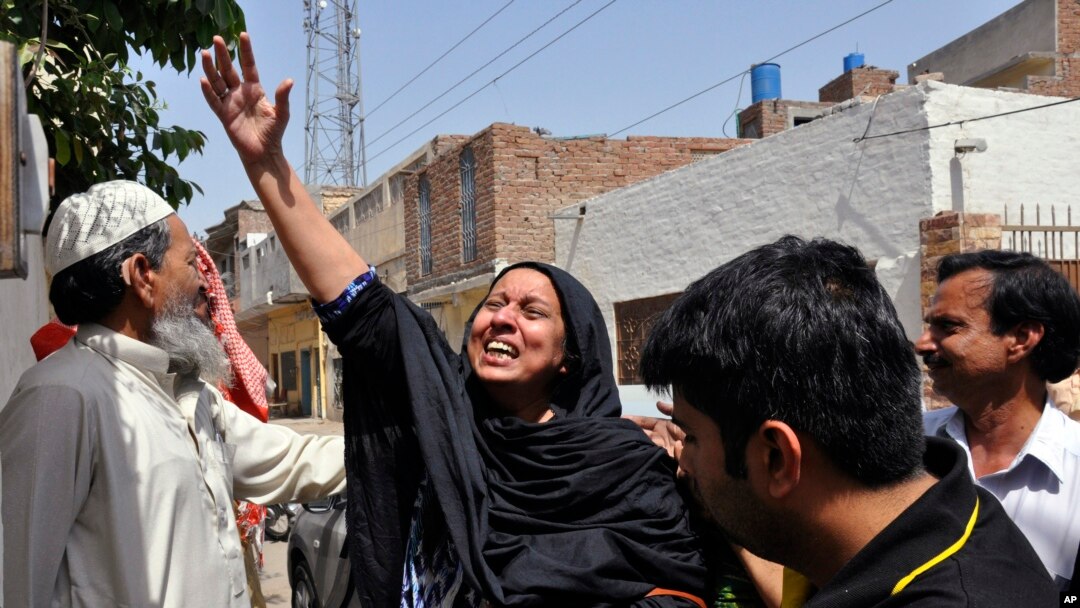Lawyers in Pakistan took to the streets Thursday to protest the killing of a human rights activist and lawyer who has defended those facing charges under Islamabad's blasphemy laws.
Police say Rashid Rehman was shot and killed in his office in the southern city of Multan in Punjab province late Wednesday.
Rehman was acting defense attorney for university lecturer Junaid Hafeez who is facing blasphemy charges after hardline students accused him of making defamatory remarks against the Prophet Mohammed last year. Hafeez had been in prison without being able to find a lawyer until Rehman agreed to represent him in February. Blasphemy carries the death penalty in Pakistan.
The chairperson of the independent Pakistan Human Rights Commission, Zohra Yusuf, told VOA on Thursday that Rehman "showed great courage but started to receive death threats right after the first hearing," which took place inside the prison.
Yusuf said the commission recently issued a statement demanding that people who were threatening Rehman be arrested. In Pakistan, she added, an environment of fear persists in blasphemy cases, with no one coming forward to defend the accused due to death threats.
Rehman's death is the latest high-profile killing linked to Pakistan's strict laws against defaming Islam. A prominent provincial governor and a Christian federal minister were assassinated in separate incidents in 2011 for criticizing the laws.
Last month a Christian couple was sentenced to death for sending a "blasphemous" text message to the imam of a mosque in the eastern town of Gojra, where riots targeting Christians erupted in 2009. The couple's lawyer Nadeem Hassan called trial procedures unfair, telling BBC the offending message was texted "from a mobile phone which has been lost previously."
Some critics of the country's blasphemy laws say the policy is sometimes exploited to unfairly target minority groups.
This report was produced in collaboration with VOA's Urdu service.
Police say Rashid Rehman was shot and killed in his office in the southern city of Multan in Punjab province late Wednesday.
Rehman was acting defense attorney for university lecturer Junaid Hafeez who is facing blasphemy charges after hardline students accused him of making defamatory remarks against the Prophet Mohammed last year. Hafeez had been in prison without being able to find a lawyer until Rehman agreed to represent him in February. Blasphemy carries the death penalty in Pakistan.
The chairperson of the independent Pakistan Human Rights Commission, Zohra Yusuf, told VOA on Thursday that Rehman "showed great courage but started to receive death threats right after the first hearing," which took place inside the prison.
Yusuf said the commission recently issued a statement demanding that people who were threatening Rehman be arrested. In Pakistan, she added, an environment of fear persists in blasphemy cases, with no one coming forward to defend the accused due to death threats.
Rehman's death is the latest high-profile killing linked to Pakistan's strict laws against defaming Islam. A prominent provincial governor and a Christian federal minister were assassinated in separate incidents in 2011 for criticizing the laws.
Last month a Christian couple was sentenced to death for sending a "blasphemous" text message to the imam of a mosque in the eastern town of Gojra, where riots targeting Christians erupted in 2009. The couple's lawyer Nadeem Hassan called trial procedures unfair, telling BBC the offending message was texted "from a mobile phone which has been lost previously."
Some critics of the country's blasphemy laws say the policy is sometimes exploited to unfairly target minority groups.
This report was produced in collaboration with VOA's Urdu service.


